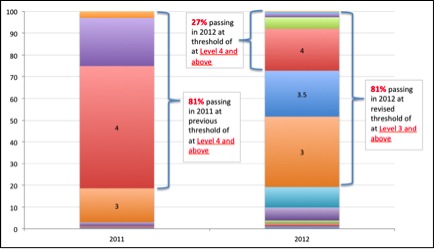FCAT uproar: What's happening
5/17/2012

This spring, students and schools will get the results of their performance on the FCAT - and it won't be an easy pill to swallow.
Significant changes to the test itself as well as tougher accountability standards have schools bracing for lower School Grades, and higher numbers of students who don't pass the annual standardized test.
The issue touched a nerve this week when the state revealed that because of changes to the way the FCAT Writes test was graded, a huge proportion of students might not pass the tests - way more. You can see the changes in the visualization above.
Why did it change?
In prior years, the Writing test was graded leniently on conventions of writing (spelling, punctuation, grammar). The reasoning was that students only had 45 minutes to complete their response, perhaps not giving them time to go through and edit for those details.
This year, those conventions of writing were graded much more strictly, though student response times were still capped at 45 minutes. (Some have suggested they should have lengthened the time to allow for more careful editing when they changed this expectation.)
In addition, more attention was paid to the relevancy and thoroughness of supporting arguments, as opposed to just the presence of supporting details in prior years. See samples of what would merit a Level 4 before and after at the end of this blog post.
The major reason for the shift to emphasizing these details now is anticipation of the expectations of the writing component of the PARCC (Common Core) assessments, which will begin in 2014-2015.
Next steps
In an emergency meeting on Tuesday, the State Board of Education voted to lower the passing threshold score from the previous 4.0 to a 3.0, saying they wanted to, in effect, "hold schools harmless" in the impact this would have had on their School Grades (an interesting precedent to set given that Reading and Math scores are also expected to fall drastically when they come out as a result of changed standards).
This ruling applies to this year only. School and district level writing scores are expected by Memorial Day.
It's worth noting that many teachers and school administrators on the conference call yesterday claimed they were not aware of how the essays would be graded differently this year. The state did post all the new examples and explanations on its website, but admitted it could have done a better job of proactively explaining the changing expectations earlier.
More to come
In addition to changes in how the writing test, students face an even tougher challenge in Reading, Math and Science on the FCAT 2.0. Although it bears the same name, FCAT 2.0 is a totally different test - not just an updated version of the original. It is much harder.
Not only is the test more difficult, but the requirements to pass it will be harder. That means that the scores required to be considered on grade level (i.e., Level 3) are much more difficult to attain. This will disproportionately affect elementary schools because the state realized that it didn't make sense that 70 percent of younger students were considered to be reading on grade level, while 30 percent of high schoolers were.
Because of this, the school grades this year will be significantly lower than in the past. The number of F schools state-wide is expected to triple.
This does not mean that our kids are getting dumber - it means we are raising the bar for them to prepare them for a future where education is more important than ever.
-- Jason & Deirdre